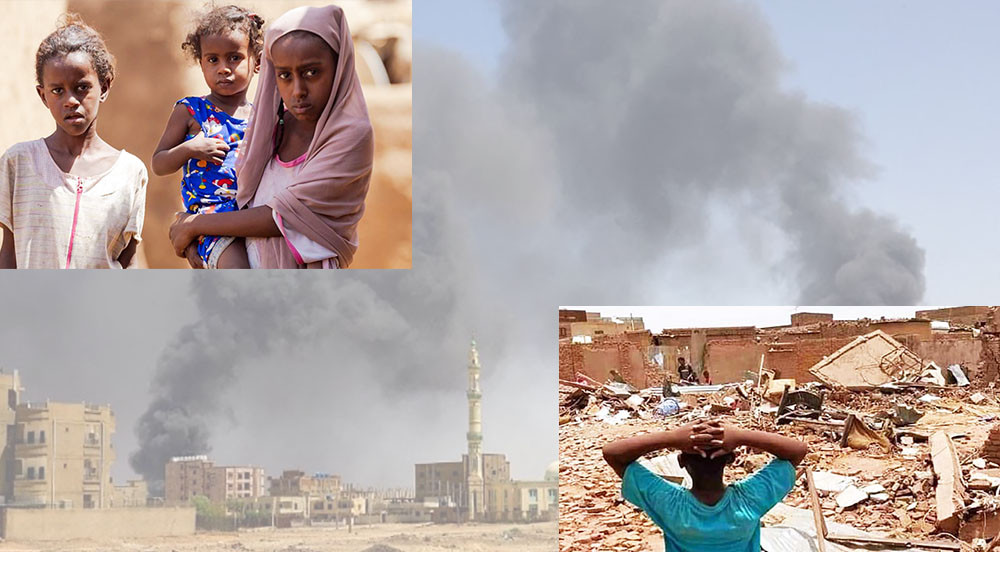
Can the Sudanese Army Gain by Going to Switzerland?
Moatinoon
American efforts and continuous pressure on the commander of the Sudanese army have borne fruit, as he announced yesterday, according to media reports, his agreement to send a delegation to Geneva to meet with both sides of the American-Saudi initiative. The decision came after the expiration of the 72-hour deadline given by the negotiators to the President of the Sovereignty Council following the start of the talks, which are scheduled to last 10 days, without the presence of a delegation from the army at the time of the talks, while representatives from the Rapid Support Forces (RSF) were present.
As the mediators continued their discussions on the third day, the US envoy to Sudan, Tom Perriello, clarified that efforts are ongoing to silence the guns in Sudan. In his daily briefing, he mentioned that the armed forces must decide to come to Switzerland.
Observers believe that the phone call between US Secretary of State Antony Blinken and General Al-Burhan two days ago marked a significant breakthrough, during which the army leadership made important concessions after the mediators hinted that legitimacy would be granted to whoever attends Switzerland, while the RSF delegation had already arrived.
Ten Days of Talks
The initiators announcement that the talks in Switzerland would last for 10 days indicates the complexity of the negotiations, which necessitates this duration, and it may be extended if necessary. Observers say that filling in the details of the pre-prepared agreement and addressing all the gaps require sitting down for this extended period.
The agreement, which builds on the previous Jeddah Agreement, includes naming committees and forces to monitor and implement the agreement. It will also prioritize opening roads, allowing humanitarian aid access, and clearing civilian and government premises of military presence. Observers expect that the ongoing efforts to end the war will face significant resistance, complicating the situation and requiring substantial effort, coordination, and financial resources to overcome these challenges.
Gains from the Army’s Presence in Switzerland
A follower of the "Citizens" platform on Facebook, Ali Hadowry, says that the army’s decision to go to Switzerland confirms its commitment to peace. He adds that engaging with the international community helps to overcome many difficulties.
Another follower, Hanfi Lawyer, considers the army’s delegation to Switzerland a gain, but with a caveat: “if it leaves behind voices that disregard the people’s interests.” He stressed that this step will be under its own conditions without compromising its sovereignty, emphasizing that the general rights of those harmed by the war must not be neglected. Hanfi Lawyer noted that the army’s stubborn refusal to sit at the negotiating table is not in its interest, as it could prolong the war and invite regional and international interventions, exacerbating the difficulty and cost of ending it, with unarmed civilians being the primary victims.
The “Citizens” platform identified several benefits Sudan could gain, according to observers, from the army’s attendance and active participation in the talks in Switzerland:
Avoiding the Consequences of Rejection: The Sudanese army’s refusal to engage in negotiations could escalate the situation, especially with American threats of military intervention, such as moving its forces in the Red Sea.
Restoring Its Role: The army’s participation prevents the international community from recognizing the legitimacy of the RSF and restores the balance of power in favor of the armed forces.
Improving Humanitarian Conditions: The army’s presence could facilitate the opening of corridors and the delivery of food aid, helping to alleviate the famine affecting many areas.
Ceasefire Agreement: Reaching an agreement could lead to a ceasefire, gradually restoring life to affected areas and allowing displaced persons to return.
Reconstruction and Compensation: The Swiss agreement could pave the way for international support for reconstruction and compensation for those affected by the war.
Overall, the army’s presence in these negotiations could enhance the chances of reaching political and humanitarian solutions that ease the suffering of the Sudanese people.

